最新整理如何保护网络隐私英语作文
如何在网络上保护自己英语作文初中
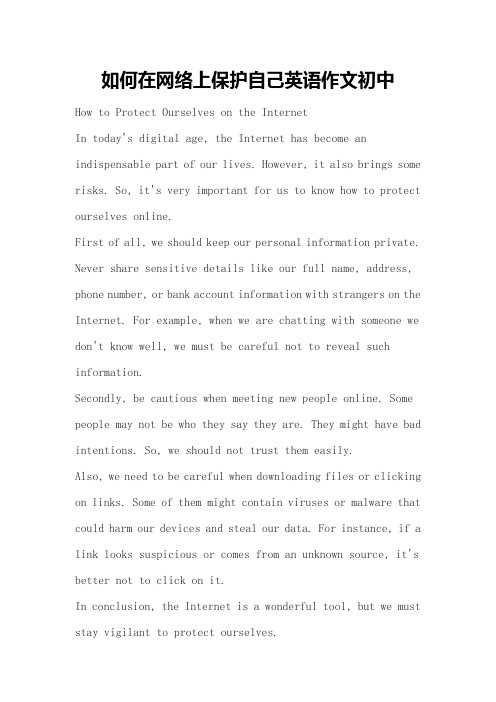
如何在网络上保护自己英语作文初中How to Protect Ourselves on the InternetIn today's digital age, the Internet has become an indispensable part of our lives. However, it also brings some risks. So, it's very important for us to know how to protect ourselves online.First of all, we should keep our personal information private. Never share sensitive details like our full name, address, phone number, or bank account information with strangers on the Internet. For example, when we are chatting with someone we don't know well, we must be careful not to reveal such information.Secondly, be cautious when meeting new people online. Some people may not be who they say they are. They might have bad intentions. So, we should not trust them easily.Also, we need to be careful when downloading files or clicking on links. Some of them might contain viruses or malware that could harm our devices and steal our data. For instance, if a link looks suspicious or comes from an unknown source, it's better not to click on it.In conclusion, the Internet is a wonderful tool, but we must stay vigilant to protect ourselves.翻译:《如何在网络上保护自己》在当今的数字时代,互联网已成为我们生活中不可或缺的一部分。
3篇关于《网络安全与隐私》英语四级作文
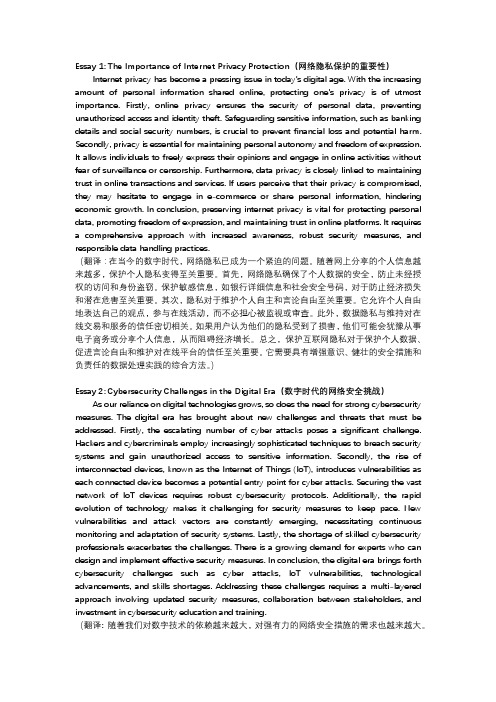
Essay 1: The Importance of Internet Privacy Protection(网络隐私保护的重要性)Internet privacy has become a pressing issue in today's digital age. With the increasing amount of personal information shared online, protecting one's privacy is of utmost importance. Firstly, online privacy ensures the security of personal data, preventing unauthorized access and identity theft. Safeguarding sensitive information, such as banking details and social security numbers, is crucial to prevent financial loss and potential harm. Secondly, privacy is essential for maintaining personal autonomy and freedom of expression. It allows individuals to freely express their opinions and engage in online activities without fear of surveillance or censorship. Furthermore, data privacy is closely linked to maintaining trust in online transactions and services. If users perceive that their privacy is compromised, they may hesitate to engage in e-commerce or share personal information, hindering economic growth. In conclusion, preserving internet privacy is vital for protecting personal data, promoting freedom of expression, and maintaining trust in online platforms. It requires a comprehensive approach with increased awareness, robust security measures, and responsible data handling practices.(翻译:在当今的数字时代,网络隐私已成为一个紧迫的问题。
保护互联网上的隐私英语作文_Protect privacy on the Internet 3篇
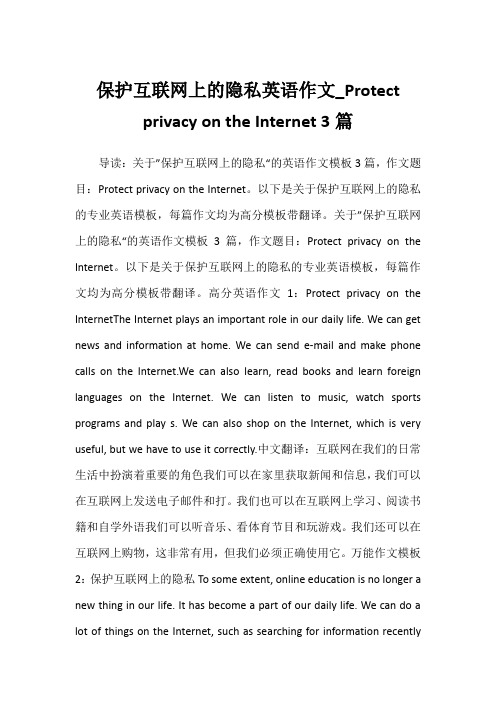
保护互联网上的隐私英语作文_Protectprivacy on the Internet 3篇导读:关于”保护互联网上的隐私“的英语作文模板3篇,作文题目:Protect privacy on the Internet。
以下是关于保护互联网上的隐私的专业英语模板,每篇作文均为高分模板带翻译。
关于”保护互联网上的隐私“的英语作文模板3篇,作文题目:Protect privacy on the Internet。
以下是关于保护互联网上的隐私的专业英语模板,每篇作文均为高分模板带翻译。
高分英语作文1:Protect privacy on the InternetThe Internet plays an important role in our daily life. We can get news and information at home. We can send e-mail and make phone calls on the Internet.We can also learn, read books and learn foreign languages on the Internet. We can listen to music, watch sports programs and play s. We can also shop on the Internet, which is very useful, but we have to use it correctly.中文翻译:互联网在我们的日常生活中扮演着重要的角色我们可以在家里获取新闻和信息,我们可以在互联网上发送电子邮件和打。
我们也可以在互联网上学习、阅读书籍和自学外语我们可以听音乐、看体育节目和玩游戏。
我们还可以在互联网上购物,这非常有用,但我们必须正确使用它。
万能作文模板2:保护互联网上的隐私To some extent, online education is no longer a new thing in our life. It has become a part of our daily life. We can do a lot of things on the Internet, such as searching for information recentlyand communicating with friends from work education has become a fashion. The popularity of online education is first of all because of its outstanding advantages. It breaks the barrier between time and space, People can easily study at home through the Internet at any time through the computer; secondly, people can no longer read those boring textbooks, but can enjoy colorful images, good sounds and charming videos, which will arouse his great interest in learning.However, the disadvantages of online education are obvious. Sometimes, due to the poor network connection, there is a lack of between students and teachers Enough interaction as the saying goes, every coin has two sides. Online education does not develop well, but also has limitations.I still believe that with the further development of the Internet, the future of online education will be better. Another network activity has become popular recently, that is online education. Why can online education be accepted by the public in such a short period of time One important reason is the rapid development of the Internet.Another deep-seated reason is the rapid development of today's society and science and technology. Modern science and technology are developing at a lightning speed. In order to catch up with this development, we all feel an urgent and strong desire to learn.In society, many people are too busy to learn in school. Online education just helps them. As far as I am concerned, I appreciate this new form of education.It is indeed a beneficialsupplement to the traditional means of education. It provides different learners with more flexible and diverse learning methods. Through online education, we can learn and absorb the latest knowledge while looking for a job.中文翻译:在某种程度上,在线不再是我们生活中的新鲜事物,它已经成为我们日常生活的一部分,我们可以在网上做很多事情,例如最近搜索信息和与远方的朋友交流,网络教育已成为一种时尚,网络教育的普及首先是因为它的突出优势,它打破了时间和空间之间的障碍,人们可以随时通过电脑上网在家里方便地学习;其次,人们不再阅读那些枯燥乏味的课本,而是可以欣赏到丰富多彩的图像,好的声音和迷人的视频,这会引起他对学习的极大兴趣然而,在线教育的缺点是显而易见的,有时由于网络连接不好,学生和老师之间缺乏足够的互动 正如俗话所说,每一枚硬币都有两面性在线教育确实发展不好,也有局限性我仍然相信随着互联网的进一步发展,网络教育的未来会更加美好,另一项网络活动最近流行起来,那就是网络教育,为什么在线教育能在这么短的时间内被公众接受,其中一个重要原因是互联网的快速发展,另一个深层次的原因是当今社会和科技的飞速发展,现代科学技术正以闪电般的速度发展着,为了赶上这一发展,我们都感到迫切而强烈的求学欲望社会上,很多人都忙得没时间在学校里学习在线教育只是帮了他们的忙。
网络隐私安全英语作文
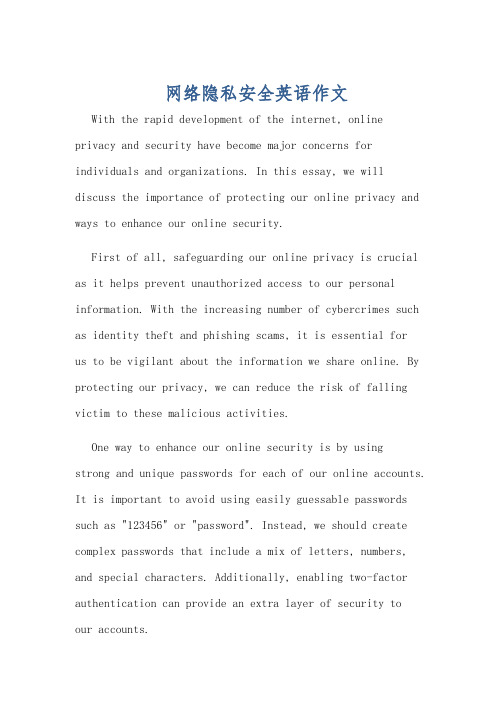
网络隐私安全英语作文With the rapid development of the internet, onlineprivacy and security have become major concerns for individuals and organizations. In this essay, we will discuss the importance of protecting our online privacy and ways to enhance our online security.First of all, safeguarding our online privacy is crucial as it helps prevent unauthorized access to our personal information. With the increasing number of cybercrimes such as identity theft and phishing scams, it is essential forus to be vigilant about the information we share online. By protecting our privacy, we can reduce the risk of falling victim to these malicious activities.One way to enhance our online security is by usingstrong and unique passwords for each of our online accounts. It is important to avoid using easily guessable passwords such as "123456" or "password". Instead, we should create complex passwords that include a mix of letters, numbers, and special characters. Additionally, enabling two-factor authentication can provide an extra layer of security toour accounts.Another important measure to protect our online privacy is to be cautious about the information we share on social media platforms. We should be mindful of the privacy settings on our accounts and limit the amount of personal information we disclose online. Cybercriminals can use the information we share on social media to target us with tailored phishing attacks.Furthermore, it is advisable to regularly update our software and antivirus programs to protect our devices from malware and security vulnerabilities. Hackers often exploit outdated software to gain access to our devices and steal sensitive information. By keeping our software up to date, we can reduce the risk of falling victim to cyberattacks.In conclusion, safeguarding our online privacy and enhancing our online security are essential in today's digital age. By taking proactive measures to protect our personal information and devices, we can minimize the risk of becoming victims of cybercrimes. It is important for individuals and organizations to prioritize online privacy and security to ensure a safe and secure online experience.随着互联网的快速发展,网络隐私和安全已成为个人和组织的重要关注点。
如何保护网络上的个人隐私英语作文
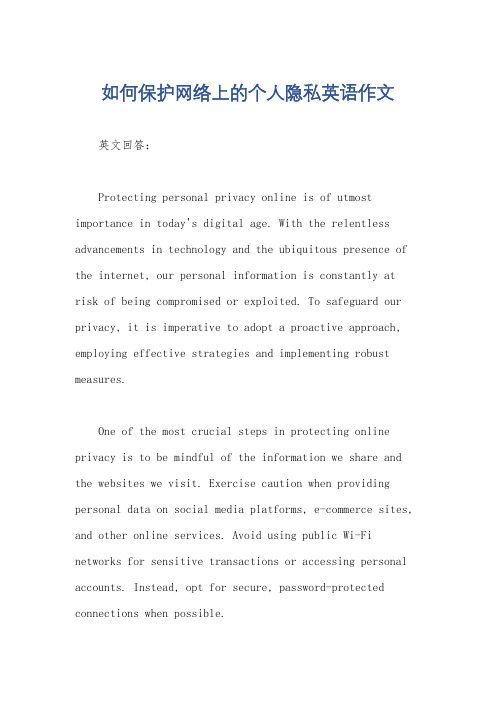
如何保护网络上的个人隐私英语作文英文回答:Protecting personal privacy online is of utmost importance in today's digital age. With the relentless advancements in technology and the ubiquitous presence of the internet, our personal information is constantly at risk of being compromised or exploited. To safeguard our privacy, it is imperative to adopt a proactive approach, employing effective strategies and implementing robust measures.One of the most crucial steps in protecting online privacy is to be mindful of the information we share and the websites we visit. Exercise caution when providing personal data on social media platforms, e-commerce sites, and other online services. Avoid using public Wi-Fi networks for sensitive transactions or accessing personal accounts. Instead, opt for secure, password-protected connections when possible.Furthermore, it is essential to use strong passwords and enable two-factor authentication whenever available. Complex passwords that incorporate a combination of uppercase and lowercase letters, numbers, and special characters are more difficult to crack. Two-factor authentication adds an extra layer of security by requiring a second form of verification, such as a code sent to your mobile device, to access your accounts.Regularly reviewing privacy settings on social media and other online accounts is also paramount. Ensure that your personal information is not publicly visible or accessible to unauthorized users. Tailor your privacy settings to limit the amount of data shared with third-party applications and services.Additionally, be wary of phishing scams and suspicious emails that request personal information. Phishing emails often appear to come from legitimate sources, but they are designed to trick you into revealing sensitive data. Avoid clicking on links or opening attachments from unknownsenders. If an email raises any red flags, report it as spam and delete it immediately.Using a virtual private network (VPN) can also enhance your online privacy by encrypting your internet traffic and concealing your IP address. This makes it more difficultfor hackers and other malicious actors to track your online activities and steal your personal data.In addition to the aforementioned measures, it is equally important to educate yourself about online privacy best practices. Stay informed about the latest threats and vulnerabilities, and keep your software and antivirus programs up to date. By adopting a comprehensive approach that encompasses both technical safeguards and mindful online behavior, you can effectively protect your personal privacy and mitigate the risks associated with the digital age.中文回答:如何在网上保护个人隐私。
如何保护网络隐私英语作
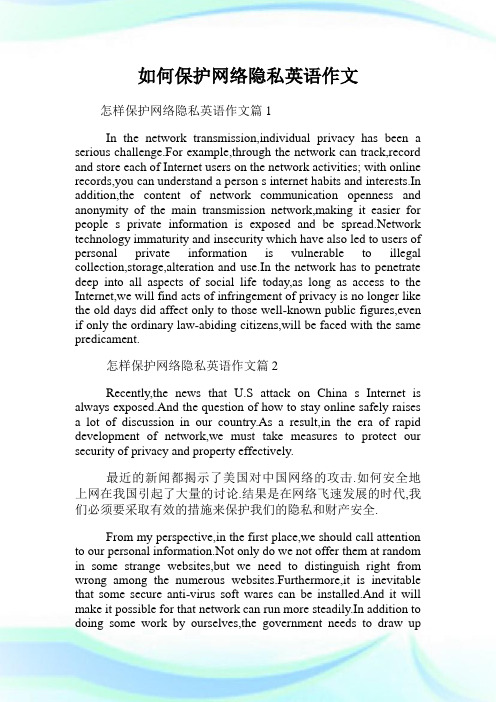
如何保护网络隐私英语作文怎样保护网络隐私英语作文篇1In the network transmission,individual privacy has been a serious challenge.For example,through the network can track,record and store each of Internet users on the network activities; with online records,you can understand a person s internet habits and interests.In addition,the content of network communication openness and anonymity of the main transmission network,making it easier for people s private information is exposed and be work technology immaturity and insecurity which have also led to users of personal private information is vulnerable to illegal collection,storage,alteration and use.In the network has to penetrate deep into all aspects of social life today,as long as access to the Internet,we will find acts of infringement of privacy is no longer like the old days did affect only to those well-known public figures,even if only the ordinary law-abiding citizens,will be faced with the same predicament.怎样保护网络隐私英语作文篇2Recently,the news that U.S attack on China s Internet is always exposed.And the question of how to stay online safely raises a lot of discussion in our country.As a result,in the era of rapid development of network,we must take measures to protect our security of privacy and property effectively.最近的新闻都揭示了美国对中国网络的攻击.如何安全地上网在我国引起了大量的讨论.结果是在网络飞速发展的时代,我们必须要采取有效的措施来保护我们的隐私和财产安全.From my perspective,in the first place,we should call attention to our personal information.Not only do we not offer them at random in some strange websites,but we need to distinguish right from wrong among the numerous websites.Furthermore,it is inevitable that some secure anti-virus soft wares can be installed.And it will make it possible for that network can run more steadily.In addition to doing some work by ourselves,the government needs to draw upsome policies to preserve national cyber security.It involves probing for deeply rooted reasons,devising creative solutions,developing high-tech talents and strengthening the supervision.从我的角度来看,首先,我们应该关注我们的个人信息.我们不仅不随随便便在一些奇怪的网站提供自己的信息,而且我们需要在众多的网站之间明辨是非.此外,安装一些安全的杀毒软件是必须的.这使得网络运行更加稳定.除了我们自己该做一些努力之外,还需要政府制定相关政策来保护国家网络安全.这就涉及到探究深层次的原因,想出有创造性的解决方案,发展高新技术人才、加强监管.Although scientists still cannot overcome the problem completely,they are studying a great deal about how to protect our national cyber security.However,consciousness of cyber security should not decline.Only in this way,we just enjoy the convenience brought by the network.尽管科学家仍无法完全克服这个问题,但是他们正在研究大量关于如何保护我们国家网络安全的办法.然而,不应该放松网络安全意识.只有这样我们才能享受到网络带给我们的便利.怎样保护网络隐私英语作文篇3Do you worry that your private information such as address, salary or telephone number on Internet will be let out without your permission? This has become the common for many people。
如何确保青少年网络安全英语作文
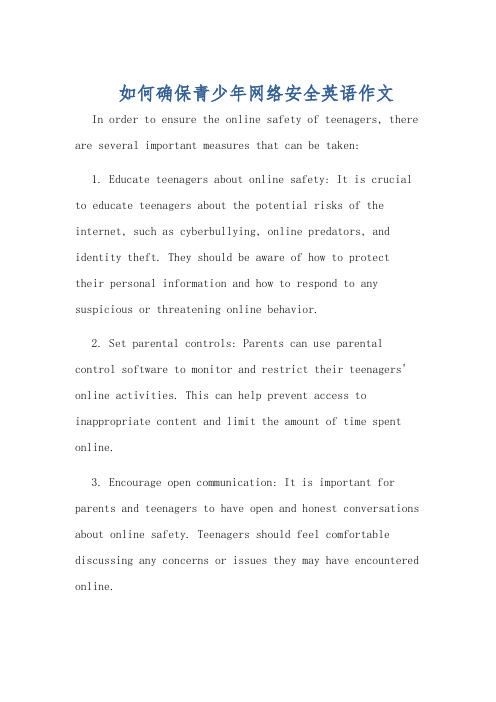
如何确保青少年网络安全英语作文In order to ensure the online safety of teenagers, there are several important measures that can be taken:1. Educate teenagers about online safety: It is crucial to educate teenagers about the potential risks of the internet, such as cyberbullying, online predators, and identity theft. They should be aware of how to protecttheir personal information and how to respond to any suspicious or threatening online behavior.2. Set parental controls: Parents can use parental control software to monitor and restrict their teenagers' online activities. This can help prevent access to inappropriate content and limit the amount of time spent online.3. Encourage open communication: It is important for parents and teenagers to have open and honest conversations about online safety. Teenagers should feel comfortable discussing any concerns or issues they may have encountered online.4. Teach responsible social media usage: Teenagersshould be taught about the importance of respecting others' privacy and avoiding sharing personal information online. They should also be aware of the potential consequences of posting inappropriate or harmful content.5. Monitor online activities: Parents should regularly monitor their teenagers' online activities, including their social media accounts, browsing history, and messaging apps. This can help identify any potential risks or issues that need to be addressed.中文:为了确保青少年的网络安全,有几项重要的措施可以采取:1. 教育青少年关于网络安全:至关重要的是要教育青少年关于互联网的潜在风险,如网络欺凌、网络犯罪分子和身份盗窃。
在互联网如何保护个人隐私英语作文
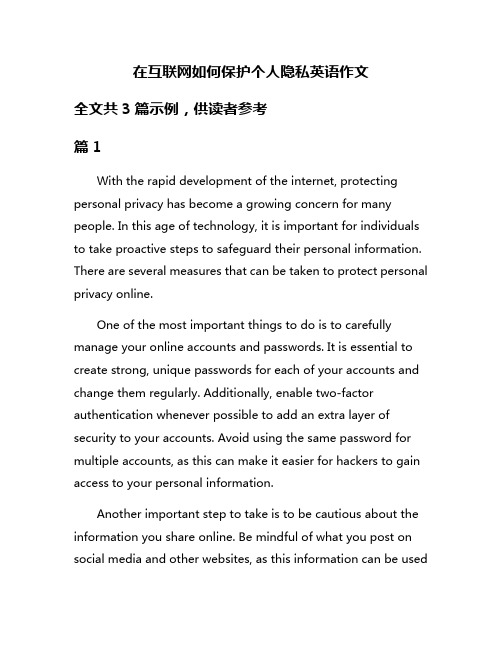
在互联网如何保护个人隐私英语作文全文共3篇示例,供读者参考篇1With the rapid development of the internet, protecting personal privacy has become a growing concern for many people. In this age of technology, it is important for individuals to take proactive steps to safeguard their personal information. There are several measures that can be taken to protect personal privacy online.One of the most important things to do is to carefully manage your online accounts and passwords. It is essential to create strong, unique passwords for each of your accounts and change them regularly. Additionally, enable two-factor authentication whenever possible to add an extra layer of security to your accounts. Avoid using the same password for multiple accounts, as this can make it easier for hackers to gain access to your personal information.Another important step to take is to be cautious about the information you share online. Be mindful of what you post on social media and other websites, as this information can be usedby companies or malicious individuals to target you with advertisements or scams. Avoid sharing sensitive or personal information, such as your home address or financial details, unless it is necessary.It is also important to be aware of the privacy settings on the websites and apps that you use. Many websites and social media platforms offer privacy settings that allow you to control who can see your information and what information is visible to others. Take the time to review and adjust these settings to ensure that your personal information is protected.Additionally, be cautious about the links you click on and the emails you open. Phishing scams are a common way for hackers to gain access to your personal information, so it is important to be skeptical of unsolicited emails or messages asking for personal information. Avoid clicking on suspicious links or downloading attachments from unknown sources.In conclusion, protecting personal privacy online is essential in this digital age. By taking proactive steps such as managing your passwords, being cautious about the information you share, and being aware of privacy settings, you can help safeguard your personal information from potential threats. Stay vigilant andinformed about online privacy practices to ensure that your personal information remains secure.篇2With the rapid development of the internet, protecting personal privacy has become a major concern for individuals. In today's digital age, where personal information is constantly being shared and accessed online, it is important to take proactive measures to safeguard our privacy. In this article, we will explore some key ways in which individuals can protect their personal privacy on the internet.One of the first steps to protecting personal privacy online is to be mindful of the information we share on social media platforms and other websites. It is important to carefully consider what information we are sharing and who can access it. For example, we should avoid sharing sensitive personal information such as our address, phone number, or financial information online. By being selective about the information we share, we can reduce the risk of our personal information falling into the wrong hands.Another important way to protect personal privacy online is to use strong, unique passwords for each online account. Weakor easily guessable passwords can make it easier for hackers to access our accounts and steal our personal information. By using complex passwords that include a mix of letters, numbers, and special characters, we can significantly enhance the security of our online accounts. Additionally, using a password manager can help us keep track of our passwords and ensure that we are using strong, unique passwords for each account.Encryption is another key tool for protecting personal privacy online. Encryption technology scrambles data to make it unreadable to unauthorized parties. By using encryption to protect our communications and sensitive information, we can help ensure that our personal information remains secure when transmitted over the internet. Many popular messaging apps and email services now offer encryption features to help users protect their privacy online.In addition to encryption, using a virtual private network (VPN) can help protect personal privacy online by masking our IP address and encrypting our internet traffic. This can help prevent third parties from monitoring our online activities and tracking our browsing habits. VPNs are particularly useful for individuals who regularly use public Wi-Fi networks, as these networks areoften targeted by hackers looking to intercept sensitive information.Another important aspect of protecting personal privacy online is staying informed about privacy laws and regulations. Understanding our rights and the legal requirements that govern the collection and use of personal information can help us make informed decisions about how we share our information online. By staying informed about privacy laws and regulations, we can better advocate for our own privacy rights and hold companies accountable for how they handle our personal information.In conclusion, protecting personal privacy online is essential in today's digital age. By being mindful of the information we share, using strong passwords, encryption, and VPNs, and staying informed about privacy laws, we can take proactive steps to safeguard our personal information on the internet. It is important for individuals to be proactive in protecting their privacy and take the necessary steps to secure their personal information online. By following these tips and best practices, we can help ensure that our personal information remains safe and secure in an increasingly interconnected world.篇3In the digital age, our personal information is more vulnerable than ever before. With the rise of social media, online shopping, and digital communication, our data is constantly being collected, shared, and stored by various companies and organizations. This poses a serious threat to our privacy and security, as our personal information can be accessed and exploited by malicious actors.To protect our personal privacy on the internet, there are several steps that individuals can take. First and foremost, it is important to be mindful of what information we share online. This includes being cautious about the personal details we provide on social media platforms, as well as being vigilant about the permissions we grant to apps and websites when we sign up for their services.Additionally, it is crucial to use strong, unique passwords for each online account we create, and to regularly update them to reduce the risk of our accounts being hacked. Two-factor authentication can also provide an extra layer of security by requiring a second form of verification, such as a code sent to our phone.Furthermore, it is important to be cautious about the websites we visit and the links we click on, as clicking onmalicious links or visiting insecure websites can expose our devices to malware and other cyber threats. Installing antivirus software and keeping it up to date can help protect our devices from these threats.In addition to taking these individual steps, it is also important for companies and organizations to take responsibility for protecting the personal data they collect from their users. This includes implementing strong data security measures, such as encryption and access controls, and being transparent about how they collect, use, and store personal information.Overall, protecting personal privacy on the internet requires a collective effort from individuals, companies, and policymakers. By taking steps to safeguard our personal information and holding organizations accountable for how they handle our data, we can help create a safer and more secure online environment for everyone.。
上网保护个人隐私英语作文
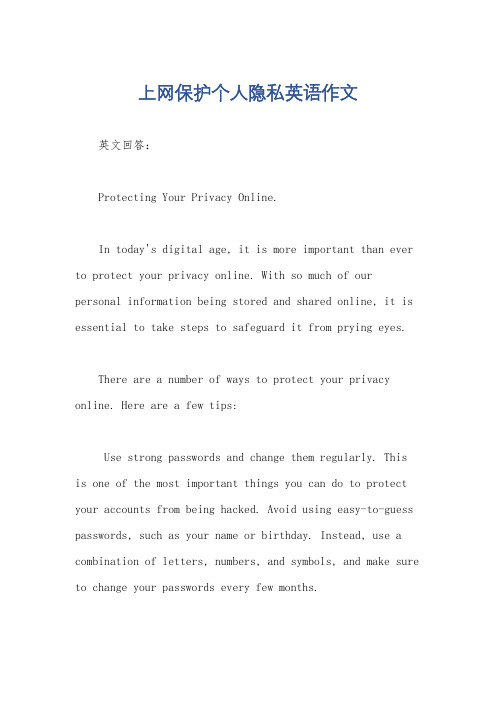
上网保护个人隐私英语作文英文回答:Protecting Your Privacy Online.In today's digital age, it is more important than ever to protect your privacy online. With so much of our personal information being stored and shared online, it is essential to take steps to safeguard it from prying eyes.There are a number of ways to protect your privacy online. Here are a few tips:Use strong passwords and change them regularly. This is one of the most important things you can do to protect your accounts from being hacked. Avoid using easy-to-guess passwords, such as your name or birthday. Instead, use a combination of letters, numbers, and symbols, and make sure to change your passwords every few months.Be careful about what information you share online. Don't post your personal information, such as your address, phone number, or email address, on public websites orsocial media. Be aware of the privacy settings on the websites you visit, and make sure that you are only sharing information with people you trust.Use a VPN. A VPN, or virtual private network, encrypts your internet traffic, making it more difficult for others to track your online activity. This is especially important if you are using public Wi-Fi networks, which are often unsecure.Be aware of phishing scams. Phishing scams are emails or websites that try to trick you into giving up your personal information. These scams often look very convincing, but they are actually designed to steal your passwords, credit card numbers, and other sensitive information. If you receive an email or visit a websitethat you think may be a phishing scam, do not click on any links or enter any information.Use privacy-enhancing browser extensions. There are a number of browser extensions available that can help you protect your privacy online. These extensions can block trackers, prevent websites from collecting your data, and even encrypt your web traffic.Protecting your privacy online is an ongoing process. By following these tips, you can help protect your personal information from falling into the wrong hands.中文回答:如何保护您在网上的隐私。
写一篇题为保护互联网隐私的英语作文
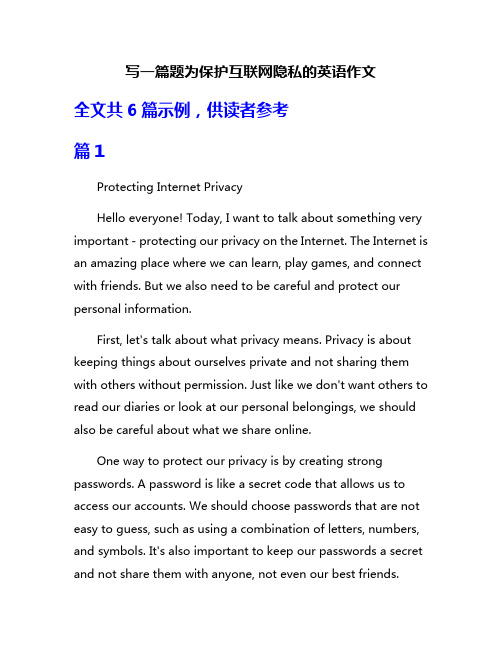
写一篇题为保护互联网隐私的英语作文全文共6篇示例,供读者参考篇1Protecting Internet PrivacyHello everyone! Today, I want to talk about something very important - protecting our privacy on the Internet. The Internet is an amazing place where we can learn, play games, and connect with friends. But we also need to be careful and protect our personal information.First, let's talk about what privacy means. Privacy is about keeping things about ourselves private and not sharing them with others without permission. Just like we don't want others to read our diaries or look at our personal belongings, we should also be careful about what we share online.One way to protect our privacy is by creating strong passwords. A password is like a secret code that allows us to access our accounts. We should choose passwords that are not easy to guess, such as using a combination of letters, numbers, and symbols. It's also important to keep our passwords a secret and not share them with anyone, not even our best friends.Another important thing to remember is to be careful about the information we share online. We should think twice before posting personal details like our full names, addresses, or phone numbers. It's better to use nicknames or initials instead of our real names. We should also be cautious about sharing pictures or videos that may reveal too much about ourselves.Sometimes, we may receive messages or friend requests from people we don't know. It's important to be cautious and not accept them without checking with a trusted adult, like our parents or teachers. We should only communicate with people we know in real life and trust.Using privacy settings on social media platforms is also very important. We can control who can see our posts and information by adjusting the privacy settings. It's a good idea to review these settings regularly and make sure we are comfortable with who can access our information.Lastly, we should always be mindful of the websites we visit and the apps we download. Some websites and apps may collect our personal information without our knowledge. It's a good habit to read the privacy policies and terms of service before using them. If we have any doubts or concerns, we should ask a grown-up for help.In conclusion, protecting our privacy on the Internet is crucial. By creating strong passwords, being cautious about the information we share, and using privacy settings, we can enjoy the benefits of the Internet while keeping our personal information safe. Remember, if in doubt, always ask a trusted adult for help. Stay safe and have fun exploring the Internet!Word count: 312 words篇2Protecting Internet PrivacyHello everyone! Today, I want to talk about something very important - protecting our privacy on the internet. In this age of technology, we use the internet for so many things like playing games, watching videos, and doing research for our homework. But it's also important to keep our personal information safe. Let's learn how we can protect our internet privacy!Firstly, it's important to keep our passwords strong and secure. A password is like a secret key that lets us access our accounts on the internet. We should never use simple passwords like "123456" or "password," as they are easy for hackers to guess. Instead, we should create strong passwords by using a combination of letters, numbers, and special characters. Wemust also remember to never share our passwords with anyone, not even our best friends!Next, we need to be careful about the information we share online. We should only share our personal information, like our name, address, and phone number, with trusted websites or adults we know. Sometimes, there are bad people on the internet who pretend to be our friends and try to get our personal information. So, we should always think twice before sharing anything online.Another way to protect our internet privacy is by adjusting our privacy settings on social media platforms. When we use social media, it's important to set our profiles to private so that only our friends can see our posts and pictures. We should also be mindful of the things we post online. Once something is on the internet, it can be very difficult to remove it completely. So, let's think before we post!We should also be careful while downloading or installing apps on our devices. Some apps may ask for permission to access our personal information or use our location. We should always read the permissions carefully before allowing access. If an app asks for more information than it needs, we should think twice before installing it. It's always better to be safe than sorry!Lastly, we should be aware of online scams and phishing attempts. Scammers try to trick us into giving them our personal information by sending fake emails or messages. They may pretend to be from a bank or a popular website. It's important to remember that no legitimate organization will ask for our personal information through email or messages. If we receive any suspicious emails or messages, we should let an adult know right away.In conclusion, protecting our internet privacy is very important. We should keep our passwords strong, be careful about the information we share online, adjust our privacy settings, be cautious while downloading apps, and stay alert for scams. By following these steps, we can enjoy the benefits of the internet while keeping ourselves safe. Let's be responsible digital citizens and protect our privacy online!Remember, stay safe and have fun exploring the internet!(Word count: 492 words)篇3Protecting Internet PrivacyHi everyone! My name is Lily, and today I want to talk about something very important – protecting our internet privacy. In this digital age, we use the internet for so many things like playing games, watching videos, and doing research for school. But it's also crucial to keep our personal information safe while we're online.First of all, what is internet privacy? Well, it means keeping our personal information and online activities private. Just like we don't want strangers to know everything about us, we also need to be careful about what we share on the internet. Here are some tips to protect our privacy:Strong Passwords: Always use strong and unique passwords for our online accounts. A strong password has a mix of letters, numbers, and symbols. We should also avoid using our name, birthdate, or simple words as passwords. Remember, don't share our passwords with anyone, not even our best friends!Be Selective with Sharing: Before sharing any personal information online, we need to think twice. Do we really need to share our full name, address, or phone number on a website or app? It's best to limit theinformation we give out and only share it on trusted and secure websites.Privacy Settings: Most social media platforms and websites have privacy settings that allow us to control who can see our information. We should always review and adjust these settings to make sure our posts and personal details are only visible to our friends and family.Avoid Strangers: Online, we can meet people we don't know. While some of them may be nice, it's important to remember that not everyone is who they say they are. We should never share personal information or meet someone we met online without our parents' permission.Think Before Clicking: Sometimes, we receive emails or messages with links or attachments. We should always be cautious and not click on suspicious links or download files from unknown sources. They could contain viruses or steal our personal information.Use Secure Websites: When we shop online or enter sensitive information like credit card details, we should make sure the website has a padlock symbol in the address bar. This means it's secure and our information is encrypted.Talk to Our Parents: Finally, if we ever feel uncomfortable or come across something that doesn't seem right online, it's essential to talk to our parents or a trusted adult. They can help us understand what to do and guide us in staying safe online.Remember, protecting our internet privacy is a responsibility we all have. By following these tips and being cautious, we can enjoy the benefits of the internet while keeping ourselves safe. Let's be smart and protect our privacy online!That's all for today, my friends. Take care and happy surfing!Love,LilyWord Count: 393 words篇4Protecting Internet PrivacyHello everyone! Today, I want to talk to you about something very important - protecting our privacy on the Internet. In this modern world, we use the Internet for many things like playing games, watching videos, and doing homework. But do you know that we also need to be careful about our privacy? Let's learn why it's important and how we can protect ourselves.First of all, what is privacy? Privacy means keeping our personal information safe and not letting others see it without our permission. Just like we don't want strangers to see our diaries or read our letters, we should also be careful about what we share online. When we use the Internet, we leave footprints behind, and it's our responsibility to protect our digital footprints.One way to protect our privacy is by using strong and unique passwords for our online accounts. A password is like a secret key that only we should know. We should never share our passwords with anyone, not even our best friends. It's also a good idea to change our passwords regularly to make sure they stay safe.Another important thing to remember is to be cautious about the information we share online. We should think twicebefore posting personal details like our full names, addresses, or phone numbers. Sometimes, bad people try to trick us by pretending to be someone they are not. This is called online deception. So, we need to be smart and only share our information with people we trust.It's also a good idea to understand the privacy settings on the websites or apps we use. Many websites have privacy settings that allow us to control who can see our information. We should take the time to learn about these settings and adjust them to our preferences. By doing so, we can ensure that only our friends or people we trust can access our information.Furthermore, we should be careful about the links and attachments we click on. Sometimes, hackers or cybercriminals send harmful links or files that can infect our computers or steal our information. If we receive any suspicious messages or emails, we should tell our parents or teachers right away. They will help us determine if it's safe or not.Lastly, we should always remember the golden rule of the Internet – "Treat others as you want to be treated." We should respect other people's privacy and not try to invade it. Just like we want our privacy to be protected, we should do the same for others.In conclusion, protecting our privacy on the Internet is very important. We should use strong passwords, be cautious about what we share online, understand privacy settings, and be careful about the links and attachments we click on. By following these steps, we can enjoy the benefits of the Internet while keeping our personal information safe. Remember, it's our responsibility to protect our digital footprints and stay safe online!That's all for now, my friends. Stay safe and protect your privacy on the Internet!篇5Protecting Online PrivacyThe internet is awesome! I can play games, watch funny videos, and learn about all sorts of cool things online. But there's something important we need to think about when we go online - privacy. What is privacy? Well, it means keeping some things private or secret, just for you.When we use the internet, we share a lot of information without even realizing it. Every time I search for something on Google or post a picture on Instagram, I'm giving away little bits of private information about myself. The websites and apps I use collect data about me like my name, age, where I live, what I like,and even keep track of the websites I visit. It's kind of creepy when you think about it!Why does my private information matter? Well, there are bad people out there who might try to steal my data and use it in harmful ways. They could try to hack into accounts, send viruses that break computers, or even try to trick kids into doing dangerous things. The information could also be sold to companies that will bombard me with advertisements trying to get me to buy their products. No one wants that many ads!Protecting my privacy online is super important to stay safe on the internet. Here are some tips I've learned about how to do that:Be picky about what you share online. Don't post personal information like your address, phone number, or which school you go to. Be careful about sharing embarrassing pictures or videos too.Use strong passwords that are hard for hackers to guess. Don't use easy ones like "password123." Mix upper and lower case letters, numbers, and symbols to make them strong.Don't click on links or open attachments from people you don't know. They could contain viruses or other malware.Ask your parents before signing up for new apps, websites, or downloading anything. They can check if it's safe first.Adjust your privacy settings on apps and websites you use. Look for options to limit who can see your information and posts.Be smart about connecting to public WiFi. Don't access private accounts when using free WiFi as hackers could be snooping.Don't take or share inappropriate pictures of yourself or others. Once they're online, you can't take them back!Tell a trusted adult if anyone ever makes you feel uncomfortable or threatened online. Don't keep it a secret.Consider using privacy protection tools like VPNs if you're really worried about your data being tracked.Remember that anything you share online could potentially last forever, so think before you post!I try to follow these tips to protect my privacy, but sometimes it's really hard, especially with all the cool new apps and games my friends are using. The companies behind them make privacy policies really long and complicated, almost likethey don't want kids to understand what data they're taking. It's not fair!I think there should be easier ways for kids to manage their privacy and know what information apps and websites are collecting about us. Maybe privacy settings could have a "kid mode" that automatically blocks anything too private from being shared. Or apps could have simple privacy ratings like video game ratings so we know how safe they are before downloading.Privacy is a pretty serious issue, but we can't let the bad guys ruin the internet for us! By being smart and following some simple tips, we can keep exploring the awesome online world while keeping our personal information safe and secure. Let's spread the word to our friends and families about why privacy matters. The more people looking out for it, the better! After all, the internet was made for everyone to learn, play, and connect - not to be spied on or taken advantage of.篇6Protecting Internet PrivacyHello everyone! Today, I want to talk about something very important - protecting our privacy on the Internet. In this digital age, we use the Internet for so many things, like playing games,watching videos, and chatting with our friends. But did you know that we need to be careful about our privacy online? Let's find out why and how we can protect ourselves.Firstly, what is privacy? Privacy means keeping our personal information and secrets safe. Just like we don't want strangers peeking into our diaries or reading our private letters, we should also be careful about who can see our information on the Internet. We have to remember that not everyone on the Internet is trustworthy or nice.One way to protect our privacy is by creating strong passwords. A password is like a secret code that only we know. We should choose passwords that are not easy to guess, like our pet's name or our birthdate. Instead, we can use a combination of letters, numbers, and symbols. It's also important not to share our passwords with anyone, even our best friends.Another thing we can do is be careful about the information we share online. We should think twice before posting something, like our address, phone number, or school name. These are personal details that should only be shared with our parents or trusted adults. It's better to be safe than sorry!Sometimes, we might receive emails or messages from people we don't know. These could be strangers trying to trick usor steal our information. It's important not to click on any links or download attachments from these messages. We should always ask our parents or teachers for help if we are unsure.We should also be careful about the websites and apps we use. Before we sign up for something or download an app, we should ask our parents if it's safe. They can help us check if the website or app is trustworthy and won't collect our personal information without permission. It's always better to be cautious.Lastly, we should keep our devices safe. We should never leave our phones, tablets, or computers unlocked and unattended. If someone gets hold of our device, they might be able to access our personal information. We should also keep our devices and apps up to date by installing the latest security updates. This can help protect us from hackers and viruses.In conclusion, it's important for us to protect our privacy on the Internet. We can do this by creating strong passwords, being careful about the information we share, avoiding suspicious messages, using safe websites and apps, and keeping our devices secure. Remember, our privacy is valuable, and we should always be cautious and smart when using the Internet. Stay safe, everyone!I hope you found this essay helpful! If you have any more questions or need further assistance, feel free to ask.。
上网时如何保护个人隐私英语作文
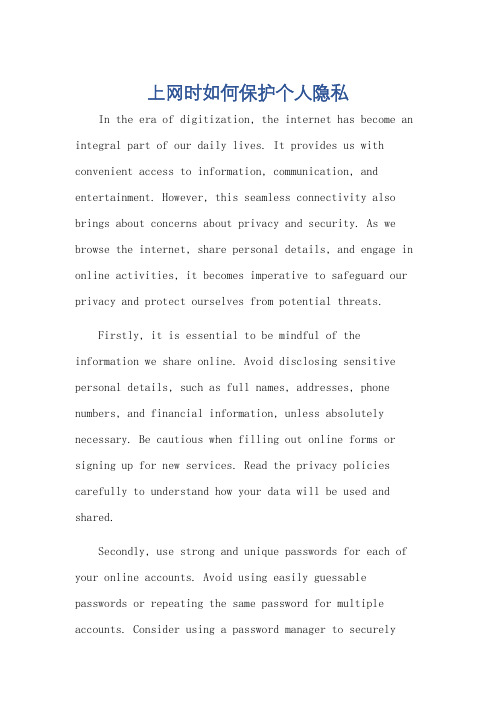
上网时如何保护个人隐私In the era of digitization, the internet has become an integral part of our daily lives. It provides us with convenient access to information, communication, and entertainment. However, this seamless connectivity also brings about concerns about privacy and security. As we browse the internet, share personal details, and engage in online activities, it becomes imperative to safeguard our privacy and protect ourselves from potential threats.Firstly, it is essential to be mindful of the information we share online. Avoid disclosing sensitive personal details, such as full names, addresses, phone numbers, and financial information, unless absolutely necessary. Be cautious when filling out online forms or signing up for new services. Read the privacy policies carefully to understand how your data will be used and shared.Secondly, use strong and unique passwords for each of your online accounts. Avoid using easily guessable passwords or repeating the same password for multiple accounts. Consider using a password manager to securelystore and generate complex passwords. Enable two-factor authentication for added security, especially for accounts with sensitive information.Moreover, be cautious about the websites and applications you use. Stick to trusted and reputable sources, and avoid downloading software or clicking onlinks from untrusted sources. Keep your software and operating system updated to ensure the latest security patches and features are installed. This helps protect your device from vulnerabilities and malicious attacks.Furthermore, utilize privacy-enhancing tools and settings. Many browsers and devices offer privacy modes or settings that can limit tracking and data collection. Consider using privacy-focused browsers or installing privacy extensions to enhance your online privacy. Additionally, adjust your social media privacy settings to control who can see your posts and information.Lastly, stay vigilant and be aware of potential scams and phishing attacks. Be suspicious of unsolicited emails or messages asking for personal information. Do not click on links or download attachments from unknown sources. Ifsomething seems suspicious, it's always better to err onthe side of caution and verify the source or ignore the message.In conclusion, protecting your privacy online is a crucial aspect of safely navigating the digital world. By being mindful of what we share, using strong passwords, sticking to trusted sources, utilizing privacy tools, and staying vigilant, we can significantly reduce the risk of privacy breaches and ensure a safer online experience.**上网时如何保护个人隐私**在数字化时代,互联网已成为我们日常生活中不可或缺的一部分。
写一篇题为保护互联网隐私的英语作文
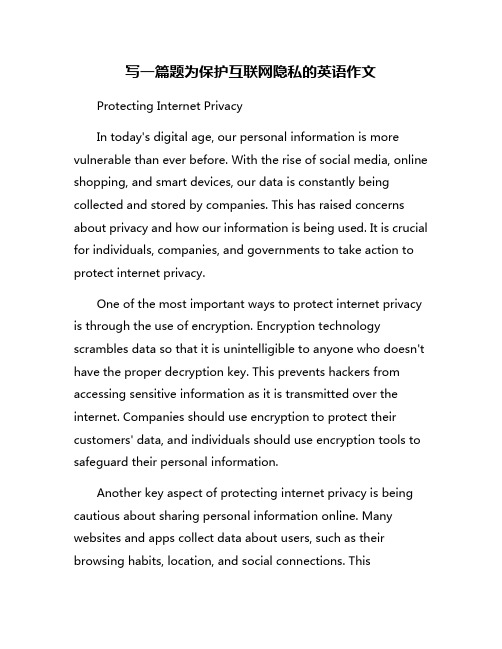
写一篇题为保护互联网隐私的英语作文Protecting Internet PrivacyIn today's digital age, our personal information is more vulnerable than ever before. With the rise of social media, online shopping, and smart devices, our data is constantly being collected and stored by companies. This has raised concerns about privacy and how our information is being used. It is crucial for individuals, companies, and governments to take action to protect internet privacy.One of the most important ways to protect internet privacy is through the use of encryption. Encryption technology scrambles data so that it is unintelligible to anyone who doesn't have the proper decryption key. This prevents hackers from accessing sensitive information as it is transmitted over the internet. Companies should use encryption to protect their customers' data, and individuals should use encryption tools to safeguard their personal information.Another key aspect of protecting internet privacy is being cautious about sharing personal information online. Many websites and apps collect data about users, such as their browsing habits, location, and social connections. Thisinformation can be used for targeted advertising, but it can also be exploited by hackers or sold to third parties. Individuals should be mindful of what they share online and consider using privacy settings to limit the amount of data that is collected about them.Companies also have a responsibility to protect their customers' privacy. They should have clear privacy policies that disclose how they collect and use data, and they should give customers the option to opt out of data collection. Companies should also use secure practices to store and transmit data, such as encrypting sensitive information and regularly updating their security systems.Governments play a crucial role in protecting internet privacy as well. They should enact laws and regulations that require companies to safeguard personal data and hold them accountable for data breaches. Governments should also promote transparency and accountability in data collection practices and provide resources for individuals to protect their privacy online.In conclusion, protecting internet privacy is essential in today's digital world. Individuals, companies, and governments all have a role to play in safeguarding personal information. Byusing encryption, being cautious about sharing data online, and implementing secure practices, we can ensure that our information remains private and secure. Let's work together to protect internet privacy and preserve the integrity of our digital lives.。
如何保护隐私英语作文
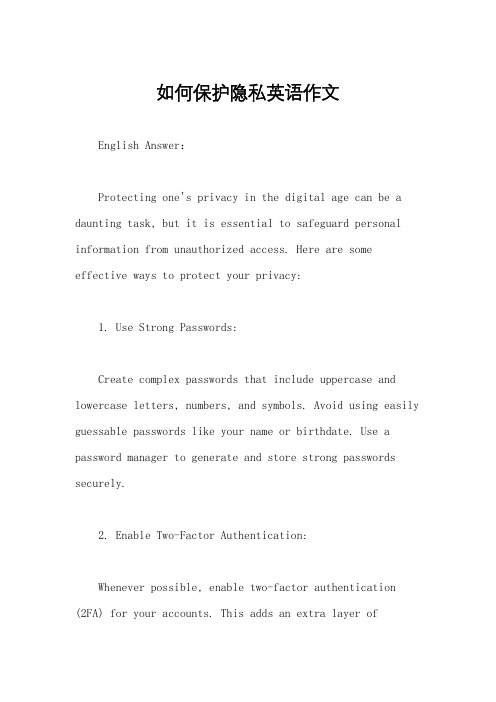
如何保护隐私英语作文English Answer:Protecting one's privacy in the digital age can be a daunting task, but it is essential to safeguard personal information from unauthorized access. Here are some effective ways to protect your privacy:1. Use Strong Passwords:Create complex passwords that include uppercase and lowercase letters, numbers, and symbols. Avoid using easily guessable passwords like your name or birthdate. Use a password manager to generate and store strong passwords securely.2. Enable Two-Factor Authentication:Whenever possible, enable two-factor authentication(2FA) for your accounts. This adds an extra layer ofsecurity by requiring you to provide a second method of verification, such as a code sent to your phone, when logging in.3. Be Cautious About Sharing Personal Information:Limit the amount of personal information you share online, especially on social media. Avoid posting sensitive data like your address, phone number, or social security number. Only provide such information on trusted websites or platforms.4. Use Privacy-Focused Browsers and Search Engines:Switch to privacy-conscious browsers like Brave or DuckDuckGo, which block tracking cookies and protect your search history. Consider using a virtual private network (VPN) to encrypt your internet traffic and hide your IP address.5. Check Privacy Settings Regularly:Review the privacy settings of your devices, social media accounts, and apps regularly. Make sure you have limited access to your personal data and only share it with trusted parties.6. Be Aware of Phishing Scams:Phishing emails and text messages attempt to trick you into revealing personal information by imitating legitimate sources. Be wary of such communications and never click on links or open attachments unless you are certain of their authenticity.7. Use Encrypted Messaging Apps:For private conversations, consider using encrypted messaging apps like Signal or WhatsApp, which offer end-to-end encryption to protect your messages from interception.8. Limit Data Collection:Disable data collection features on your deviceswhenever possible. This includes location services, microphone access, and camera permissions. Only grant these permissions to apps that require them for essential functions.9. Consider a Privacy Audit:Regularly perform a privacy audit to identify areas where your personal information may be exposed. Check your social media profiles, delete old accounts you no longer use, and remove yourself from data broker websites.10. Educate Yourself:Stay informed about privacy issues and best practices. Read articles, attend workshops, and follow privacy advocates to enhance your understanding of privacy protection.中文回答:如何保护隐私。
大学英语四级作文如何保护网络隐私
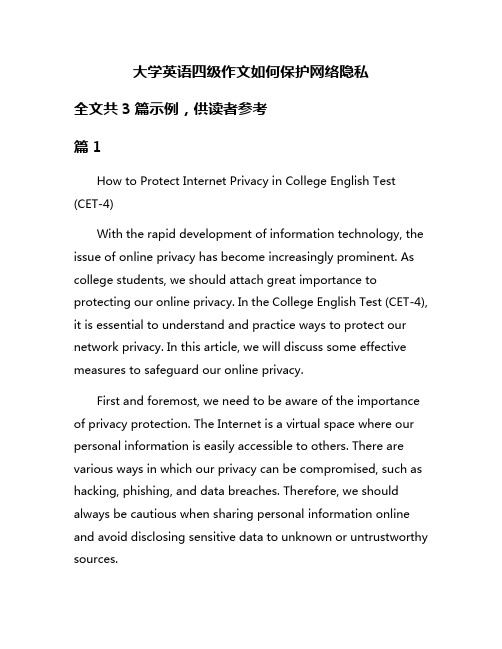
大学英语四级作文如何保护网络隐私全文共3篇示例,供读者参考篇1How to Protect Internet Privacy in College English Test (CET-4)With the rapid development of information technology, the issue of online privacy has become increasingly prominent. As college students, we should attach great importance to protecting our online privacy. In the College English Test (CET-4), it is essential to understand and practice ways to protect our network privacy. In this article, we will discuss some effective measures to safeguard our online privacy.First and foremost, we need to be aware of the importance of privacy protection. The Internet is a virtual space where our personal information is easily accessible to others. There are various ways in which our privacy can be compromised, such as hacking, phishing, and data breaches. Therefore, we should always be cautious when sharing personal information online and avoid disclosing sensitive data to unknown or untrustworthy sources.Secondly, we should utilize strong passwords to secure our online accounts. A complex password that includes a combination of letters, numbers, and symbols can significantly reduce the risk of unauthorized access to our accounts. Furthermore, it is advisable to change our passwords regularly and avoid using the same password for multiple accounts.Additionally, enabling two-factor authentication (2FA) can provide an extra layer of security for our online accounts. By requiring a verification code in addition to our password, 2FA helps prevent unauthorized access even if our password is compromised. This simple yet effective measure can greatly enhance the security of our online accounts.Moreover, we should be cautious when using public Wi-Fi networks. Public Wi-Fi hotspots are often unsecured, making it easy for hackers to intercept our online activities and steal our sensitive information. To protect our privacy when using public Wi-Fi, we should use a virtual private network (VPN) to encrypt our internet connection and ensure secure online browsing.Furthermore, we should regularly update our software and applications to patch any vulnerabilities that could be exploited by cybercriminals. Outdated software is a common target for hackers, as it may contain known security flaws that can be easilyexploited. By keeping our devices and applications up to date, we can minimize the risk of falling victim to cyber attacks.Last but not least, we should be mindful of our online behavior and exercise caution when sharing personal information on social media platforms. Cybercriminals can use the information we post online to gather personal details and potentially steal our identities. Therefore, we should be selective about the information we share online and adjust our privacy settings to limit the visibility of our posts to the public.In conclusion, protecting our online privacy is essential in today's digital age. As college students preparing for the CET-4 exam, it is crucial to understand the importance of privacy protection and implement effective measures to safeguard our personal information online. By following the aforementioned tips and staying vigilant against online threats, we can ensure a safer and more secure online experience. Let's all work together to protect our network privacy and create a safer cyber environment for ourselves and others.篇2How to Protect Online Privacy in CollegeIn today's digital age, protecting online privacy has become increasingly important, especially for college students who spend a significant amount of time on the internet. With the rise of social media, online shopping, and cloud storage, it has become easier for personal information to be accessed and exploited. Therefore, it is essential for college students to be vigilant in safeguarding their online privacy. In this article, we will discuss some tips on how to protect online privacy as a college student.1. Use strong and unique passwordsOne of the simplest yet most effective ways to protect your online privacy is by using strong and unique passwords for all your accounts. Avoid using easily guessable passwords such as "123456" or "password". Instead, create passwords that are at least eight characters long and include a mix of letters, numbers, and special characters. Additionally, use different passwords for each of your accounts to prevent hackers from gaining access to all your accounts if one password is compromised.2. Enable two-factor authenticationTwo-factor authentication adds an extra layer of security to your accounts by requiring you to provide a secondary form of verification, such as a code sent to your phone, in addition toyour password. Enable two-factor authentication for all your online accounts, especially for those that contain sensitive information such as your email, social media, and financial accounts.3. Be cautious of phishing attemptsPhishing is a common tactic used by hackers to trick people into providing their personal information, such as login credentials or financial details. Be wary of unsolicited emails, messages, or phone calls that ask for sensitive information or urge you to click on a suspicious link. Always verify the source of the communication before responding or clicking on any links.4. Limit the amount of personal information you share onlineBe mindful of the personal information you share online, especially on social media platforms. Avoid posting sensitive information such as your address, phone number, or financial details. Review the privacy settings of your social media accounts and adjust them to limit who can view your posts and profile information.5. Use a VPN when accessing public Wi-Fi networksWhen accessing the internet on public Wi-Fi networks, such as those in coffee shops or libraries, use a Virtual Private Network(VPN) to encrypt your connection and protect your data from potential hackers. A VPN creates a secure tunnel for your internet traffic, preventing unauthorized access to your information.6. Regularly update your devices and softwareKeep your devices and software up to date with the latest security patches and updates. Updates often include fixes for security vulnerabilities that could be exploited by hackers. Set your devices to automatically install updates to ensure you are protected against the latest threats.7. Monitor your online accounts for suspicious activityPeriodically review the activity on your online accounts, such as checking your login history and transaction history for any unauthorized activity. If you notice any suspicious activity, change your passwords immediately and contact the respective account provider for further assistance.In conclusion, protecting online privacy as a college student requires awareness, vigilance, and proactive measures. By following the tips outlined in this article, you can help safeguard your personal information and reduce the risk of falling victim to online threats. Remember that online privacy is a fundamentalright, and it is essential to take the necessary steps to protect it. Stay safe online!篇3Protecting online privacy has become a major concern in today's digital age. With the rapid advancement of technology and the widespread use of the internet, individuals are constantly sharing personal information online, making them vulnerable to cyber threats and privacy violations. This is particularly important for college students who are active internet users and may not always be aware of the potential risks associated with sharing personal information online.There are several ways in which college students can protect their online privacy. First and foremost, it is important to be cautious about the information that is shared online. This includes being mindful of the types of information that is shared on social media platforms, as well as the websites and apps that are used. It is essential to be aware of the privacy settings on these platforms and to regularly review and update them to ensure that personal information is protected.Another important step in protecting online privacy is to use strong and unique passwords for online accounts. It isrecommended to use a combination of letters, numbers, and special characters to create a secure password, and to avoid using the same password for multiple accounts. Additionally, enabling two-factor authentication on accounts can provide an extra layer of security and help prevent unauthorized access.College students should also be wary of phishing scams and other online threats. Phishing scams often involve sending emails or messages that appear to be from a legitimate source, such as a bank or social media platform, in an attempt to trick individuals into revealing personal information. It is important to be cautious of any unsolicited emails or messages, and to avoid clicking on links or providing personal information in response to these messages.It is also important to regularly update software and security settings on devices to protect against potential vulnerabilities. This includes installing antivirus software, firewall protection, and updating operating systems and applications to ensure that they are equipped with the latest security features.In addition to taking these steps to protect online privacy, college students should also be mindful of their digital footprint and the long-term implications of the information that is shared online. Once information is posted online, it can be difficult tocompletely erase it, and it may potentially be accessed by others in the future. It is important to think before sharing personal information online and to consider the potential consequences of sharing sensitive information.In conclusion, protecting online privacy is essential in today's digital age, especially for college students who are active internet users. By being cautious about the information that is shared online, using strong passwords, being aware of online threats, and regularly updating security settings, college students can take steps to safeguard their online privacy. Additionally, being mindful of their digital footprint and the long-term implications of online sharing can help college students make informed decisions about how they interact online. By taking these steps, college students can help protect their online privacy and reduce the risk of falling victim to cyber threats and privacy violations.。
在互联网如何保护个人隐私英语作文
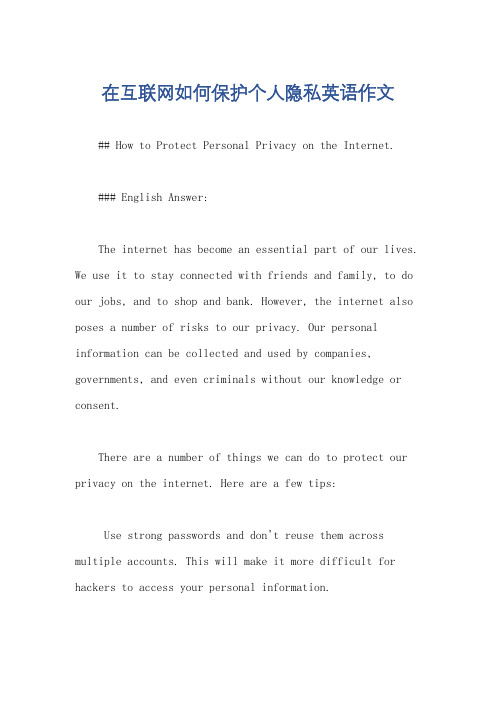
在互联网如何保护个人隐私英语作文## How to Protect Personal Privacy on the Internet.### English Answer:The internet has become an essential part of our lives. We use it to stay connected with friends and family, to do our jobs, and to shop and bank. However, the internet also poses a number of risks to our privacy. Our personal information can be collected and used by companies, governments, and even criminals without our knowledge or consent.There are a number of things we can do to protect our privacy on the internet. Here are a few tips:Use strong passwords and don't reuse them across multiple accounts. This will make it more difficult for hackers to access your personal information.Be careful about what information you share online. Don't post your Social Security number, credit card number, or other sensitive information on social media or other public websites.Use privacy settings to control who can see your personal information. Most social media platforms and other websites allow you to control who can see your posts and other personal information.Be aware of the privacy policies of the websites you visit. Read the privacy policies of websites before you provide any personal information.Use a virtual private network (VPN). A VPN can help to protect your privacy by encrypting your internet traffic.Use privacy-focused browsers and search engines. Privacy-focused browsers and search engines don't collect or track your personal information.Be aware of the risks of using public Wi-Fi networks.Public Wi-Fi networks are often not secure, and your personal information can be easily intercepted.Educate yourself about privacy issues. The more you know about privacy, the better you can protect yourself online.### 中文回答:如何在网上保护个人隐私。
英语作文 网络隐私
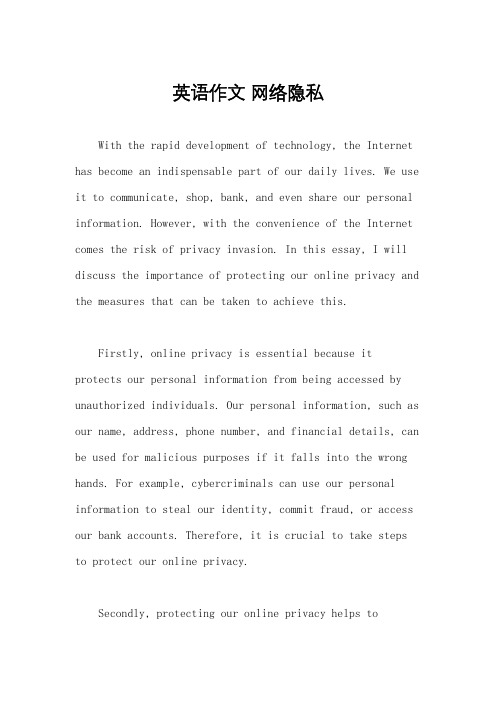
英语作文网络隐私With the rapid development of technology, the Internet has become an indispensable part of our daily lives. We use it to communicate, shop, bank, and even share our personal information. However, with the convenience of the Internet comes the risk of privacy invasion. In this essay, I will discuss the importance of protecting our online privacy and the measures that can be taken to achieve this.Firstly, online privacy is essential because it protects our personal information from being accessed by unauthorized individuals. Our personal information, such as our name, address, phone number, and financial details, can be used for malicious purposes if it falls into the wrong hands. For example, cybercriminals can use our personal information to steal our identity, commit fraud, or access our bank accounts. Therefore, it is crucial to take steps to protect our online privacy.Secondly, protecting our online privacy helps tomaintain our freedom of expression. The Internet is a platform where we can express our opinions and share our thoughts freely. However, if our online activities are monitored, we may feel hesitant to express ourselves freely. This can have a chilling effect on our freedom ofexpression and ultimately limit our ability to participatein public discourse.To protect our online privacy, there are several measures that we can take. Firstly, we should use strongand unique passwords for all our online accounts. This will make it more difficult for hackers to access our accounts. Secondly, we should avoid sharing our personal information online unless it is necessary. For example, we should avoid sharing our full name, address, and phone number on social media platforms. Thirdly, we should use privacy-enhancing tools such as VPNs (Virtual Private Networks) and Tor browsers to protect our online activities from being monitored.In addition to individual measures, there are also measures that can be taken at the organizational andgovernmental level to protect online privacy. Organizations should implement strong data protection policies and practices to ensure that customer data is protected. Governments should also enact laws and regulations that protect online privacy and hold organizations accountable for any breaches of data protection.In conclusion, protecting our online privacy is crucial for our personal security and freedom of expression. It is important for individuals to take measures to protect their online privacy, and for organizations and governments to implement policies and regulations that protect online privacy. By working together, we can ensure that the Internet remains a safe and free platform for everyone.。
保护网络个人隐私的英语作文100字
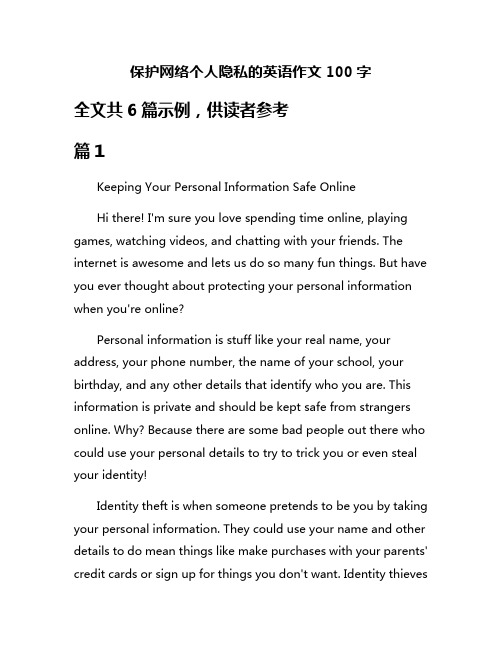
保护网络个人隐私的英语作文100字全文共6篇示例,供读者参考篇1Keeping Your Personal Information Safe OnlineHi there! I'm sure you love spending time online, playing games, watching videos, and chatting with your friends. The internet is awesome and lets us do so many fun things. But have you ever thought about protecting your personal information when you're online?Personal information is stuff like your real name, your address, your phone number, the name of your school, your birthday, and any other details that identify who you are. This information is private and should be kept safe from strangers online. Why? Because there are some bad people out there who could use your personal details to try to trick you or even steal your identity!Identity theft is when someone pretends to be you by taking your personal information. They could use your name and other details to do mean things like make purchases with your parents' credit cards or sign up for things you don't want. Identity thievesare cyber criminals and they trick kids and adults alike into giving away their private info. So we have to be really careful online.Here are some tips for keeping your personal information away from identity thieves:Use a fun screen name instead of your real name when playing online games or participating in chat rooms and forums. Avoid any usernames that include your name, age, birthday, or location.Never share personal details like your address, phone number, school name, or birthday in online conversations, even if it's just with friends you've made over the internet. You don't really know who they are!Be very cautious about posting any personal information on social media sites, even stuff that seems harmless. Identity thieves can piece together clues from different places to figure out who you are.Pick strong passwords that are hard to guess, and don't use the same password for multiple accounts. A strong password mixes letters, numbers, and symbols. Definitely don't use obvious stuff like your name, age, or birthdate.Ask your parents before filling out any online forms or signing up for accounts, games, or websites. They can check if the site is safe and appropriate to use.Don't click on links or open attachments from people you don't know, even if they seem friendly. Those could contain viruses trying to steal your data.Be very skeptical of anyone you meet online who asks for your personal details, even if they sound completely trustworthy. Predators are smart and great at tricking kids.Adjust your social media privacy settings to limit what personal information is visible to people you don't know in real life. Your profiles should be private except to your closest friends and family.Don't ever share passwords with anyone except your parents. Not even your very best friends!Tell a parent, teacher, or trusted adult if anything weird or suspicious ever happens when you're online. They can help protect you.It's so much fun being able to connect with people all over the world through the internet. But we have to be really careful with our personal information to avoid identity theft and otheronline dangers. Criminals are sneaky, so don't make it easy for them! Follow these tips to surf safely.Just because someone seems nice on the other side of the computer doesn't mean you can trust them with private details about yourself. Be smart, be cautious, and keep your personal info to yourself when you're online. If you ever feel unsafe or uncomfortable, log off and tell a trusted adult right away.The virtual world is amazing, but the real world is pretty great too. Don't forget to spend plenty of time away from screens, playing outside, reading books, doing activities, and spending quality time with your family and friends in person. That's the best way to stay happy and healthy!Enjoy all the awesome things the internet has to offer, but always keep your personal information private and secure online. Stay safe out there, and happy surfing!篇2Protecting Your Privacy OnlineHi friends! Today I want to talk to you about something super important - protecting your privacy when you're online. The internet is an awesome place where we can learn new things,play games, watch videos, and chat with our buddies. But there are also some not-so-awesome people out there who might try to steal your personal information or pictures if you're not careful.Let me give you an example. Let's say you love playing online games like Roblox or Minecraft. It's really fun to create your own avatar and interact with other players from all over the world, right? But sometimes, strangers might send you messages asking for details like your real name, where you live, what school you go to, or other private info. They might even ask you to send them pictures! That's a huge no-no. You should never, ever share personal details like that with people you don't know and trust in real life. Those strangers could be creepy adults just pretending to be kids. Yuck!Another example is when you're surfing the web and a popup appears saying you won the latest iPhone or a million dollars! All you have to do is click the link and enter your parents' credit card number. As tempting as that sounds, don't fall for it! Those are phishing scams trying to trick you into giving away sensitive financial information that could let bad people steal from your family.Speaking of family, you should also be really careful about what kinds of pictures and videos you share online. Maybe you took a funny selfie and you want to share it with your friends and followers. That's usually okay, as long as the photo is appropriate and doesn't reveal anything too personal or embarrassing. But you definitely don't want to share pics that could make you or your family uncomfortable in the future. And never, ever share naked pictures or videos of yourself or anyone else - that's illegal and could get you into serious trouble!Your parents probably have rules about what websitesyou're allowed to visit and how much time you can spend online each day. Those rules might be a pain, but they're in place to protect you. The internet can be an awesome educational resource, but it also has some dark corners filled with inappropriate or even dangerous content that isn't meant for kids.I'm sure some of you are rolling your eyes right now, thinking "Duh, I already know all this stuff about online safety!" But you'd be surprised how many kids and teens make mistakes that compromise their privacy and security. The consequences can range from mild embarrassment to serious risk of harm.So what can you do to safeguard your privacy? Here are some tips:Use strong passwords and don't share them with anyone, even your closest friends.Don't overshare personal information online, whether in social media bios, online forms, or direct messages.Be very cautious about opening links or attachments from unknown senders.Don't accept friend requests or follow requests from strangers.Adjust your privacy settings to limit who can see your posts and personal info.Never share your specific location or home address online.If you encounter something inappropriate or creepy, log off immediately and tell a trusted adult.Your parents, teachers, and other adults are always lecturing you guys about internet safety because they care about you and want to protect you from snoops, creeps, scammers, and bullies. But we kids need to do our part too. Protecting your online privacy isn't just smart, it's cool!When you're more conscious about what you share and who you share it with, you get to control your own narrative. You choose what the world sees about you, rather than having embarrassing stuff leak out there without your consent. You don't want to end up as a cringeworthy meme that goes viral and humiliates you, do you? No way!Looking after your privacy online also means looking out for your friends and younger siblings. If you see them oversharing or making other privacy blunders, give them a gentle reminder. We've all made mistakes, but good friends have each other's backs.At the end of the day, the internet is an incredibly powerful tool that can connect you to amazing resources, ideas, and people from all around the globe. But just like in the real world,you need to be smart, safe, and watch out for sketchballs trying to take advantage of you. With some basic precautions, you can surf, chat, post, and play to your heart's content without compromising your privacy and security.So there you have it, friends! Protecting your privacy online doesn't have to be boring or complicated. Just exercise a little common sense, listen to trusted adults, and err on the side of caution when it comes to sharing personal info. The internet isway more fun when you don't have to worry about snoops and creeps, am I right? Now get out there and engage with the online world while still being safe and smart. Your privacy is your power!篇3Protecting Your Privacy OnlineHi friends! Today I want to talk to you about something really important - protecting your privacy when you're online. The internet is an amazing place where we can learn, play games, watch videos, and stay connected with family and friends. But there are also some risks when it comes to protecting our personal information and privacy online.You might be wondering - what exactly is online privacy? Well, it's about keeping your personal details, like your name, address, phone number, and other information that could identify you, safe and secure when you're using the internet. It's important to protect this information because if it falls into the wrong hands, it could be used to steal your identity or money, bully or harass you, or even put you in physical danger.There are lots of ways that your privacy could be compromised online. Sometimes, websites or apps might try tocollect information about you without you realizing it. Or, you might accidentally share too much personal information in a post or message. Hackers could also try to gain access to your accounts or devices to steal your data.But don't worry, there are things you can do to protect yourself! Here are some tips for staying safe online:Be careful what you share. Never post your full name, address, phone number, or other sensitive information online where others can see it. Also, be mindful of sharing too many personal details or photos that could identify you or where you live.Use strong passwords. Your passwords should be long, complex, and unique for each account. Avoid using common words or phrases that could be easily guessed. A password manager can help you create and store strong passwords securely.Keep software updated. Make sure you install updates for your operating system, web browser, apps, and other software as soon as they're available. These updates often include important security fixes.Be cautious of links and attachments. Never click on suspicious links or open attachments from people you don't know and trust, as they could contain malware or viruses.Use privacy settings. Most websites and apps have privacy settings that let you control what information is shared and who can see it. Take some time to adjust these settings to limit what others can access.Be wise about Wi-Fi. Public Wi-Fi networks aren't always secure, so it's best to avoid accessing sensitive accounts or sharing personal information while using them.Talk to a trusted adult. If you ever feel unsafe online or think your privacy may have been compromised, tell a parent, teacher, or other trusted adult right away so they can help.Following these tips can go a long way in protecting your online privacy and staying safe on the internet. But privacy isn't just about protecting yourself - it's also about respecting the privacy of others.When you're online, remember to be kind and considerate. Don't share someone else's personal information or embarrassing photos without their permission. If someone asks you to remove something about them, you should respect theirwishes. Bullying, harassment, and invading others' privacy is never okay.The internet is an amazing resource, but it's important that we all work together to keep it a safe and respectful place for everyone. By being smart about what you share and taking steps to secure your accounts and devices, you can enjoy all the great things the online world has to offer while still protecting your privacy.So there you have it, friends! Online privacy is super important, but it doesn't have to be scary or complicated. Just follow the tips I've shared, and you'll be browsing, playing, and connecting online safely in no time. Let's all do our part to keep the internet awesome!篇4Protecting My Privacy OnlineHi there! My name is Jamie and I'm 10 years old. Today I want to talk to you about something really important – keeping our information safe and private when we use the internet. The internet is awesome and lets us do so many cool things like watch videos, play games, and chat with our friends. But thereare also some dangers we need to be careful about when we go online.One of the biggest dangers is sharing too much personal information. Personal information is stuff like your full name, your address, your phone number, the school you go to, your birthdate, and other details about you and your family. This is called private information because it's only supposed to be shared with people you know and trust in real life, like your parents or teachers.But when we use websites, apps, games and social media, we have to be really careful about what personal information we share. That's because there are bad people out there who might try to trick us into telling them private details so they can do bad things with that information. Some of them even pretend to be other kids online just to get us to trust them!For example, let's say you're playing an online game and someone asks what your mom's name is or where you live. That's personal information you should never share with people you don't know in real life! Or if a website asks for your full birthdate, you can just give the month and day but not the year. That way you're not telling strangers exactly how old you are.Another thing to be careful about is posting photos and videos online. Before you share a photo or video, you should ask yourself: "Would I be okay with anyone in the world being able to see this?" That's because once it's posted online, it can be almost impossible to delete it completely. The photo could get shared again and again without you knowing. So you have to think twice before posting anything too personal or embarrassing.Speaking of photos, you should also get permission before posting pictures of other people, especially kids your age. Just because your friend is in the photo with you doesn't mean you can share it without asking them first. Getting permission shows respect for other people's privacy.One more privacy tip - be careful what you say in emails, texts, chats, and comments on websites. Anything you share online could potentially be seen by anyone, even if you think it's just being shared with a friend or a small group. Kids have gotten in big trouble before for being mean or saying inappropriate things online that their parents or teachers ended up seeing.So in summary, here are the main things to remember about staying safe and private online:Don't share personal details like your address, phone number, birthdate or school name with strangers.Be careful about what photos/videos you post and get permission before sharing images of other people.Avoid saying anything mean, rude or inappropriate in emails, texts, chats or comments.If something online ever makes you uncomfortable, tell a trusted adult right away!Privacy online is really important, but it can also be confusing sometimes with all the apps, websites and technologies we use nowadays. The most important rule is to always think carefully before you share any information or content. If you're ever unsure, ask an adult you trust for help.Protecting your privacy isn't just about keeping you safe - it also protects your family too. So let's all be smart, cautious, and make good choices to guard our personal information. The internet is an awesome place, and by following some simple privacy rules, we can all explore it safely and securely!篇5Protecting Our Privacy OnlineHi friends! Do you love using the internet and playing games or watching videos online? I sure do! But did you know that when we go online, there are some sneaky people and companies that might try to get our personal information? That's not cool at all! Our privacy is really important, and we need to protect it.What is privacy, you ask? Well, it means keeping things about ourselves private or secret, so that only the people we want to know those things can know them. Some examples of private information are our full names, addresses, phone numbers, and other details about us and our families.When we're online, there are folks called "hackers" who try to get that private information from us in bad ways. They might send fake emails or make fake websites that look real, trying to trick us into giving them our private details. That's not nice at all!There are also companies that collect information about what websites we visit, what games we play, and what videos we watch online. They do this so they can show us ads for things they think we might like based on our interests. While ads aren't always bad, we don't really want companies knowing everything about us, right?So how can we protect our privacy online? Here are some tips:Be careful what you share. Don't give out your full name, address, phone number, or other personal details to anyone online unless you really know and trust them, like your parents or teachers. Even if a website asks for that information, you don't have to give it!Use strong passwords. Passwords are like secret codes that let you into your accounts. Make them hard for others to guess, with a mix of letters, numbers, and symbols. And don't use the same password for everything!Check privacy settings. Many websites and apps have settings that let you control how much of your information is shared with others. Ask your parents to help you adjust these settings to keep your stuff private.Be cautious of links and attachments. Don't click on any links or download any files unless you know for sure they're safe and from a trusted source. Bad links and files can have viruses that steal your info.Talk to trusted adults. If you're ever unsure about something online, or if something seems fishy, talk to your parents, teachers, or other trusted grown-ups. They can help you stay safe!Remember, the internet is a great place to learn, play, and connect with friends. But we need to be smart about protecting our privacy too. By following these tips, we can have fun online without giving away too much about ourselves.What do you think, friends? Will you help me spread the word about online privacy and safety? We can all do our part to keep our personal information safe and secure. Let's make the internet an awesome but private place for kids like us!篇6Protecting Our Online Privacy - An Important LessonMy name is Emily and I'm 10 years old. I love using the internet to learn new things, play games, and chat with my friends. But Mom and Dad are always reminding me about being careful online to protect my privacy. At first, I didn't really understand why it was such a big deal. But after they explained it to me, I realized how important it is!On the internet, there are lots of websites and apps that try to collect information about us without us even knowing it. They want to know things like what videos we watch, what games we play, what websites we visit, and even where we live or go to school. The reason they want this private information is so they can send us ads and try to get us to buy things or sign up for services.Some of the ways they can get our private info is by tracking the things we search for online, the posts we make on social media, the apps and games we use, and even our location if we have location services turned on our phones or tablets. Crazy, right? It's like having someone follow you around the mall noting down everything you look at in store windows!Mom says some of these companies will even try to make profiles about us based on the data they collect – they'll guess things like how old we are, if we're a boy or girl, what kind of things we like, etc. Then they can target advertisements directly at us based on those profiles. She says it's important to be careful about what personal information we share online.Giving out too many personal details can even make kids vulnerable to bad people who might want to locate us or trick us in other ways. That's why we should never share private detailslike our address, school, phone number, or even our real names and photos in public online spaces.There are a few key things Mom and Dad taught me about protecting my online privacy that I try to always follow:Use nicknames or just my first name online instead of giving out my full real name.Never share private details like my home address, school, phone number, etc. with anyone online.Ask my parents before signing up for any new online accounts, apps or services.Be cautious about what personal information I post publicly online, like photos showing my school uniform or writing about my hobbies/routines.Keep my social media profiles set to private so only approved friends/followers can see my posts.Don't accept friend requests from people I don't actually know in real life.On top of that, Mom and Dad have some privacy settings enabled on my devices and accounts to limit the data companies can collect about my online activities. Things like ad-trackingblockers, turning off location services for certain apps, and deleting cookies frequently.I still get to use the internet and have fun online, but I understand now why it's important to be smart about protecting my personal information and privacy. The internet is an awesome place for learning and entertainment, but we have to be careful about how much of our private lives we share out there. A little caution can go a long way in keeping our personal details safe from companies or bad people who might abuse or misuse that sensitive information.I'm glad my parents taught me these online privacy lessons from a young age. Knowing how to protect my privacy online will help keep me safer and allow me to use the internet with more peace of mind. I encourage all kids my age to have a discussion with their parents about online privacy too so we can all learn to navigate the internet smartly while still having a good time! Our personal information is precious, so we need to be the guardians of our own privacy.。
保护网络隐私的英语四级作文
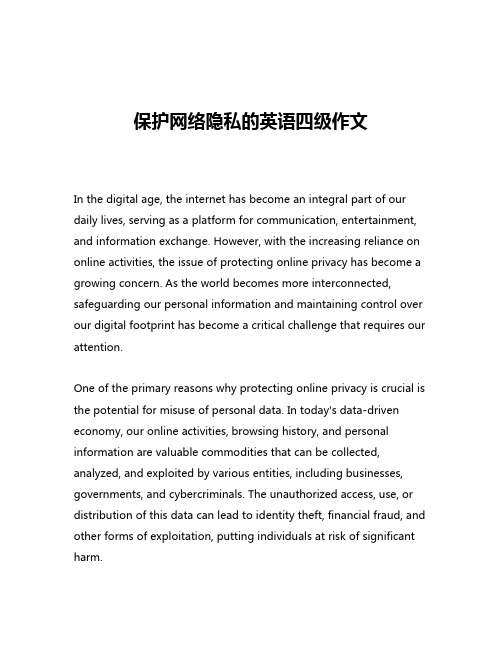
保护网络隐私的英语四级作文In the digital age, the internet has become an integral part of our daily lives, serving as a platform for communication, entertainment, and information exchange. However, with the increasing reliance on online activities, the issue of protecting online privacy has become a growing concern. As the world becomes more interconnected, safeguarding our personal information and maintaining control over our digital footprint has become a critical challenge that requires our attention.One of the primary reasons why protecting online privacy is crucial is the potential for misuse of personal data. In today's data-driven economy, our online activities, browsing history, and personal information are valuable commodities that can be collected, analyzed, and exploited by various entities, including businesses, governments, and cybercriminals. The unauthorized access, use, or distribution of this data can lead to identity theft, financial fraud, and other forms of exploitation, putting individuals at risk of significant harm.Furthermore, the widespread use of social media platforms has exacerbated the issue of online privacy. These platforms often encourage users to share personal details, photographs, and experiences, with the promise of connecting with friends and family. However, the terms of service and privacy policies of many social media platforms can be complex and opaque, leaving users unaware of how their data is being collected, used, and shared. This can lead to unintended consequences, such as the exposure of sensitive information to third parties or the use of personal data for targeted advertising or political manipulation.To address these concerns, it is essential that individuals take proactive steps to protect their online privacy. One of the most fundamental measures is to be cautious about the information we share online. This includes being mindful of the types of personal details we disclose on social media, email, and other online platforms, and carefully considering the potential implications of sharing such information. Additionally, it is crucial to use strong and unique passwords for all online accounts, and to enable two-factor authentication whenever possible to add an extra layer of security.Another important aspect of protecting online privacy is the use of privacy-enhancing technologies, such as virtual private networks (VPNs), encrypted messaging apps, and web browsers with built-in privacy features. These tools can help to mask our online activity,encrypt our communications, and prevent third parties from tracking our digital footprint. By utilizing these technologies, we can significantly reduce the risk of our personal information being accessed or misused.Furthermore, it is essential that individuals stay informed about the latest privacy threats and best practices for protecting their online data. This may involve regularly reviewing privacy policies, monitoring for data breaches, and staying up-to-date with the latest news and research on online privacy and security. Additionally, individuals should be proactive in advocating for stronger privacy regulations and holding businesses and governments accountable for their data practices.In conclusion, protecting online privacy is a critical issue that requires the collective effort of individuals, businesses, and policymakers. By taking proactive steps to safeguard our personal information, utilizing privacy-enhancing technologies, and advocating for stronger privacy protections, we can work towards a more secure and privacy-conscious digital landscape. As the digital world continues to evolve, it is essential that we remain vigilant and committed to preserving our right to privacy in the online realm.。
- 1、下载文档前请自行甄别文档内容的完整性,平台不提供额外的编辑、内容补充、找答案等附加服务。
- 2、"仅部分预览"的文档,不可在线预览部分如存在完整性等问题,可反馈申请退款(可完整预览的文档不适用该条件!)。
- 3、如文档侵犯您的权益,请联系客服反馈,我们会尽快为您处理(人工客服工作时间:9:00-18:30)。
如何保护网络隐私英语作文网络隐私现在的人们越来越重视了,它的一些保护方式我们就从英语作文中了解吧。
下面是学习啦小编给大家整理了怎样保护网络隐私英语作文,供大家参阅!怎样保护网络隐私英语作文篇1I n t h e n e t w o r kt r a n s m i s s i o n,i n d i v i d u a l p r i v a c y h a s b e e n a s e r i o u s c h a l l e n g e.F o r e x a m p l e,t h r o u g h t h e n e t w o r k c a nt r a c k,r e c o r d a n d s t o r e e a c h o f I n t e r n e t u s e r s o n t h e n e t w o r k a c t i v i t i e s;w i t h o n l i n e r e c o r d s,y o u c a n u n d e r s t a n d a p e r s o n s i n t e r n e t h a b i t s a n di n t e r e s t s.I n a d d i t i o n,t h e c o n t e n t o f n e t w o r kc o m m u n i c a t i o n o p e n n e s s a nd a n o n y m i t y o f t he m a i n t r a n s m i s s i o n n e t w o r k,m a k i n g i t e a s i e rf o r p e o p l e s p r i v a t e i n f o r m a t i o n i s e x p o s e d a n d b es p r e a d.N e t w o r k t e c h n o l o g y i m m a t u r i t y a n di n s e c u r i t y w h i c h h a v e a l s o l e d t o u s e r s o f p e r s o n a l p r i v a t e i n f o r m a t i o n i s v u l n e r a b l e t o i l l e g a lc o l l e c t i o n,s t o r a g e,a l t e r a t i o n a nd u s e.I n t h en e t w o r k h a s t o p e n e t r a t e d e e p i n t o a l l a s p e c t s o fs o c i a l l i f e t o d a y,a s l o n g a s a c c e s s t o t h eI n t e r n e t,w e w i l l f i n d a c t s o f i n f r i n g e m e n t o fp r i v a c y i s n o l o n g e r l i k e t h e o l d d a y s d i d a f f e c t o n l y t o t h o s e w e l l-k n o w n p u b l i c f i g u r e s,e v e n i f o n l y t h e o r d i n a r y l a w-a b i d i n g c i t i z e n s,w i l l b ef a c e d w i t h t h e s a m e p r e d i c a m e n t.怎样保护网络隐私英语作文篇2R e c e n t l y,t h e n e w st h a t U.S a t t a c k o n C h i n a s I n t e r n e t i s a l w a y se x p o s e d.A n d t h e q u e s t i o n of h o w t o s t a y o n l i n es a f e l y r a i s e s a l o t o f d i s c u s s i o n i n o u r c o u n t r y.A s a r e s u l t,i n t h e e r a o f r a p i d d e v e l o p m e n t o fn e t w o r k,w e m u s t t a k e m e a s u r e s t o p r o t e c t o u rs e c u r i t y o f p r i v a c y a n d p r o p e r t y e f f e c t i v e l y.最近的新闻都揭示了美国对中国网络的攻击.如何安全地上网在我国引起了大量的讨论.结果是在网络飞速发展的时代,我们必须要采取有效的措施来保护我们的隐私和财产安全.F r o m m y p e r s p e c t i v e,i n t h e f i r s t p l a c e,w es h o u l d c a l l a t t e n t i o n t o o u r p e r s o n a li n f o r m a t i o n.N o t o n l y d o w e n o t o f f e r t h e m a t r a n d o mi n s o m e s t r a n g e w e b s i t e s,b u t w e n e e d t o d i s t i n g u i s h r i g h t f r o m w r o n g a m o n g t h e n u m e r o u sw e b s i t e s.F u r t h e r m o r e,i t i s i n e v i t a b l e t h a t s o m e s e c u r e a n t i-v i r u s s o f t w a r e s c a n b e i n s t a l l e d.A n d i t w i l l m a k e i t p o s s i b l e f o r t h a t n e t w o r k c a n r u n m o r e s t e a d i l y.I n a d d i t i o n t o d o i n g s o m e w o r k b y o u r s e l v e s,t h e g o v e r n m e n t n e e d s t o d r a w u p s o m ep o l i c i e s t o p r e s e r v e n a t i o n a l c y b e r s e c u r i t y.I t i n v o l v e s p r o b i n g f o r d e e p l y r o o t e dr e a s o n s,d e v i s i n g c r e a t i v e s o l u t i o n s,d e v e l o p i n gh i g h-t e c h t a l e n t s a n d s t r e n g t h e n i n g t h es u p e r v i s i o n.从我的角度来看,首先,我们应该关注我们的个人信息.我们不仅不随随便便在一些奇怪的网站提供自己的信息,而且我们需要在众多的网站之间明辨是非.此外,安装一些安全的杀毒软件是必须的.这使得网络运行更加稳定.除了我们自己该做一些努力之外,还需要政府制定相关政策来保护国家网络安全.这就涉及到探究深层次的原因,想出有创造性的解决方案,发展高新技术人才、加强监管.A l t h o u g h s c i e n t i s t s s t i l l c a n n o t o v e r c o m e t h e p r o b l e m c o m p l e t e l y,t h e y a r e s t u d y i n g a g r e a t d e a l a b o u t h o w t o p r o t e c t o u r n a t i o n a l c y b e rs e c u r i t y.H o w e v e r,c o n s c i o u s n e s s o f c y b e r s e c u r i t y s h o u l d n o t d e c l i n e.O n l y i n t h i s w a y,w e j u s t e n j o y t h e c o n v e n i e n c e b r o u g h t b y t h e n e t w o r k.尽管科学家仍无法完全克服这个问题,但是他们正在研究大量关于如何保护我们国家网络安全的办法.然而,不应该放松网络安全意识.只有这样我们才能享受到网络带给我们的便利.怎样保护网络隐私英语作文篇3D o y o u w o r r y t h a t y o u r p r i v a t e i n f o r m a t i o n s u c h a s a d d r e s s,s a l a r y o rt e l e p h o n e n u m b e r o n I n t e r n e t w i l l b e l e t o u tw i t h o u t y o u r p e r m i s s i o n? T h i s h a s b e c o m e t h e c o m m o n f o r m a n y p e o p l e。
你是否担心你网上的私人信息,如地址、工资或电话号码在未经你许可的情况下被泄露呢?这对许多人来说已变得很常见了。
T h e h o t d i s c u s s i o n o n h o w t o p r o t e c t p r i v a c y o n I n t e m e t h a s l a s t e d f o r t h e s e y e a r s. T h e f o l l o w i n gs e v e r a l r e a s o n s a r e a p p r o v e d b y t h e m a i n s t r e a m o f t h e s o c i e t y.F o r o n e t h i n g,o u r g o v e m m e n t i se x p e c t e d t o m a k e s t r i c t e r l a w s o r r e g u l a t i o n s t o p r o t e c t p r i v a c y o n I n t e r n e tf r o m l e a k i ng o u t. F o r a n o th e r, b o t h m a s s m e di a a n d s c h o o l s s h o u l d e d u c a t e p e o p l e t o k e e p t h e i r p r o m i s e s a n d s e a l t h e i r m o u t h s o n o t h e r s p r i v a c y.B e s i d e s,i n s o m e f i e l d s,p e r s o n a l i n f o r m a t i o n h a s b e e n t r a n s a c t e d f o rp u r s u i n g p r o f i t s.A n d t h e r e f o r e c u t t i n g o f f t h e p r o f i t a b l e c h a i n p l a y s a v i t a l r o l e i n p r o t e c t i n g p e r s o n a l p r i v a c y。
